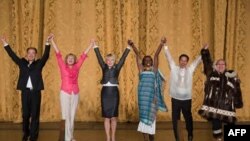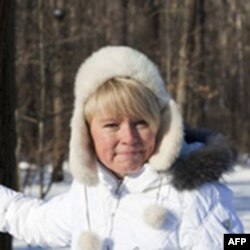FAITH LAPIDUS: Welcome to AMERICAN MOSAIC in VOA Special English.
(MUSIC)
I’m Faith Lapidus. This week on our program, we play music from the singer-songwriter Santigold…
And, check out some of the advice on our relationship blog for a very shy man in Brazil …
But first we tell about the recent winners of the twenty-twelve Goldman Prize for environmental activism.
(MUSIC)
2012 Goldman Prize
FAITH LAPIDUS: OSTThe Goldman Environmental Foundation recently recognized a group of individuals for their efforts to protect the environment. Each year, the American-based group honors environmental activists from six different areas.
The first three winners of the twenty-twelve Goldman Prize are from Kenya, the Philippines and China. Barbara Klein tells about them.
BARBARA KLEIN: The Goldman Environmental Foundation says Ikal Angelei is a hero to the people who live around Lake Turkana. The Kenyan woman received the award because of her efforts to halt a dam project on a river in Ethiopia. Critics say the dam would harm the lake and restrict the flow of water for people who live nearby. Ikal Angelei formed an organization called the Friends of Lake Turkana. Its campaign against the dam was successful. And, the project has been halted – for now.
The Philippine island of Mindoro is home to tribes that depend on the area’s natural resources for food and jobs. Edwin Gariguez became concerned when a European company announced plans to mine for nickel on the island. The Roman Catholic clergyman said waste materials from the mining project would pollute the water and destroy the forests. So he launched a campaign to stop the project.
As part of his protest, the clergyman refused to eat. The Goldman Environmental Foundation says his actions influenced government officials to suspend the mining permit.
In China, Ma June is working with businesses to clean up their pollution. He formed a group that collects information about pollution, and publishes it on the Internet. His group also uses maps to identify factories that violate air and water safety rules. He hopes the Chinese public will use the information to stop the violations.
(MUSIC)
FAITH LAPIDUS: The Goldman Prize was also awarded to activists from Argentina, Russia and the United States. Bob Doughty has their stories.
BOB DOUGHTY: Sofia Gatica of Argentina is from a town where farmers commonly use pesticide products to protect soybean crops from insects. The town also has a high rate of cancer. Miz Gatica believed that pesticide use was responsible for the death of her baby. She worked with other mothers to get government officials to ban the use of agrochemicals near populated areas.
Evgenia Chirikova is a leading opponent of plans to build a road through a protected forest just outside Moscow. She has demanded that Russian officials re-direct the road away from the forest. She and her followers have been arrested and detained for their activities. However, their campaign has gained widespread public support.The sixth winner of the Goldman Environmental Prize is American Caroline Cannon -- a community leader in Point Hope, Alaska. Miz Cannon is fighting to keep Arctic waters safe from oil and gas exploration. She is concerned that an oil spill would endanger her coastal village and the area’s wildlife.
She and the other award winners were honored at ceremonies last month in San Francisco, California. The winners also were honored at a ceremony in Washington, DC.
Each Goldman Prize awardee received one hundred fifty thousand dollars. Caroline Cannon says some of her money will go to help her village.
(MUSIC)
Advice for the Shy
FAITH LAPIDUS: Now we turn to some of the comments posted on our relationship advice blog. A twenty-year-old engineering student from Brazil wrote recently about his struggle with extreme shyness. He says he cannot talk to people at his university. He even has troubling speaking in class to his teachers.
He says he is friendless and suffered depression last semester. He says he does not know how to get better.
Some of you had ideas. Carlos, also from Brazil, suggested that the student may be suffering from social anxiety disorder and should seek professional help. Carlos says the young man might need medication like antidepressants. Gina also advised the man to get professional help. She suggested talk therapy and joining a support group.
Several comments came from people who shared their own difficulty with shyness and how they overcame it. Someone from Turkey wrote about having had almost no friends at university and talking to a school therapist. She suggested joining a club at school. The student joined the chess club and made some friends that way.
Jambo from Tanzania had similar advice for the engineering student in Brazil: Try to engage yourself in sports or clubs that make you feel strong and confident. Jambo says he formed a soccer team at his college: When we play I automatically find myself talking and laughing. Now all my shyness and fear have gone, says Jambo.
If you have a problem for our relationship advice blog, send it to us -- it can involve work, school, dating, marriage, family or friends. Write to mosaic@voaspecialenglish.com. We won't use your name but please tell us your sex, age and country.
(MUSIC)
Santigold “Master of My Make-Believe”
HOST: Santigold has worked with musicians from Kanye West to Lily Allen to Christina Aguilera and the Beastie Boys. She has traveled and performed with the Beastie Boys and other artists, including Bjork and Coldplay.
Santigold writes songs, produces and sings. Her latest record album is called “Master of My Make-Believe.” It was released four years after her first album. Katherine Cole has some of the new songs.
KATHERINE COLE: Santigold told Pitchfork.com that the rebellions and riots that have been taking place around the world influenced much of the album. She said it seemed like a truth was coming out. She said the song “Disparate Youth” is about young people creating their own world instead of just accepting what is given to them. The song says: Don't look ahead there's stormy weather / Another road block in our way / But if we go, we go together / Our hands are tied here if we stay.
(MUSIC)
Santigold was born Santi White in Philadelphia, Pennsylvania. She released her first album under the name Santogold. A childhood friend had given her the name because of the big, round, gold jewelry she wore on her ears. But, she recently changed her stage name to Santigold because someone else claimed rights to the name.
The first song from “Master of My Make-Believe” is called “Bigmouth.” It criticizes artists who make shallow, superficial music just for fame and money. Santigold sings: Big mouth, big mouth, quiet now, you said enough / Got a big mouth, big mouth, my my my, you said enough.
(MUSIC)
Santigold says writer’s block was part of the reason it took her four years to make a new album. She took several steps to clear her mind, including climbing Tanzania’s Mount Kilimanjaro. She also studied transcendental meditation. She said this activity brought calm and the belief that she could write again. “Master of My Make-Believe” is the proof.We leave you with Santigold performing, “The Keepers,” from her new album.
(MUSIC)
FAITH LAPIDUS: I’m Faith Lapidus. Our program was written by George Grow and Caty Weaver, who was also our producer.
Go to voaspecialenglish.com to find transcripts and MP3s of our programs. Join us again next week for music and more on AMERICAN MOSAIC in VOA Special English.





